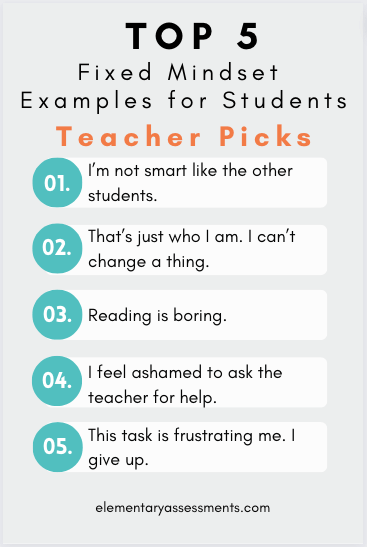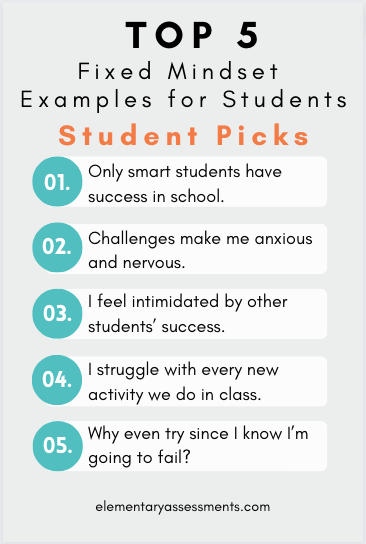If you’re searching for fixed mindset examples for students, you’ve landed in the right place.
We are all aware that students are on a learning journey toward achieving academic goals.
While hard work is undoubtedly a key ingredient to success, equally important (if not more important) is a proper mindset.
Even with strong academic skills, a student won’t go far without a growth mindset.
That’s why it’s imperative to recognize fixed mindset behaviors in order to address them appropriately.
Here you will find fixed mindset examples for students that may show up in your classroom.
Having students acknowledge this type of thinking will help them to stop, reflect, evaluate, and pivot towards a more positive mindset.
What does it mean to have a fixed mindset?
A fixed mindset is the belief that one’s talents, personality, and level of intelligence are set and cannot be improved upon no matter the efforts put forward.
The 5 key characteristics of a fixed mindset are…
- Hiding flaws in order to avoid judgment
- Feeling threatened by others’ intelligence
- The avoidance of challenges in order to not face challenges
- A belief that intelligence is static
- Seeing feedback as personal attacks
If the goal is to help students develop a growth mindset, educators must encourage positivity along with risk-taking.
What is the importance of having a growth mindset?
Possessing a growth mindset means that students embrace learning from mistakes and move forward with achieving goals despite facing challenges and experiencing uncomfortableness.
While a growth mindset is necessary for success, this post focuses on fixed mindset examples for students.
Fixed Mindset Examples For Students
Following you will find many good real-life examples of fixed mindset thinking that students may possess.
1. When I compare myself to my classmates, I feel bad about myself.
2. I’m not smart like the other students.
3. Some students are just naturally smart. I’m not one of them.
4. It’s just too much work to improve my academic weaknesses.
5. I need to rush through my work so that I can be the first one done.
6. Participating in class discussions frightens me so I just sit silently.
7. Every other student is better than me.
8. Reciting positive affirmations regularly is a waste of time.
9. I already have good grades. I don’t have room to improve.
10. That’s just who I am. I can’t change a thing.
11. Reading is boring.
12. This topic that we’re studying in class doesn’t seem relevant to my life.
13. When I make a mistake, I feel so embarrassed.
14. I’ll never be good at doing this.
15. There is a limit to how much I can learn and achieve.
16. Why should I bother studying when I know that I will fail the test anyway?
17. Why put forth any effort? I know I’m not going to succeed.
18. Successful students are just lucky.
19. Reaching my SMART goals is too hard.
20. I don’t like constructive criticism.

21. No one knows more than I do about this subject.
22. Since I always get good grades, I don’t need to study as hard.
23. Memorizing my multiplication facts (insert any skill) is too overwhelming to accomplish.
24. I feel ashamed to ask the teacher for help.
25. My handwriting can’t be improved. That’s just the way that I write.
26. It’s not fair that the same students always get the best scores on tests.
27. I don’t want to hear anyone’s opinion about a topic.
28. This task is frustrating me. I give up.
29. I offer no value when working in a group.
30. There is nothing I could have done differently to change the outcome.
31. Everybody is smarter and more talented than me.
32. It seems as though my teacher gave me the most boring classroom helper job.
33. I will never be as good of a writer as my classmates.
34. Only smart students have success in school.
35. Why even try since I know I’m going to fail?
36. I am incapable of completing this assignment independently.
37. Completing class assignments is a waste of time.
38. I’m not smart enough to do that.
39. If this task seems too hard, I’m not going to even try.
40. My talents are not valuable.
41. I feel intimidated by other students’ success.
42. When I struggle, that means that I’m not smart enough to complete the task.
43. Challenges make me anxious and nervous.
44. I’m no good at this. Why should I even bother giving my energy to it?
45. What’s the point of trying if I know for sure that I’m going to fail?

46. I can already tell that this assignment or project will be too overwhelming for me.
47. There is nothing good about my personality or work habits.
48. I’m smart, so I don’t have to try harder.
49. Straight As are the only thing that matters in school.
50. When it comes to fixed growth mindset examples for students, why is it necessary to avoid this type of thinking?
51. My teacher is giving me constructive criticism. She must think I am a bad student.
52. I prefer to work only on tasks in which I know I can succeed.
53. When someone says something negative about me, I believe it to be true.
54. I’m not a creative person. That’s why I don’t do well with arts and crafts projects.
55. Waiting until the last minute to do things is just the way I am.
56. None of my classmates care about what value I can contribute to a group.
57. I’ll never be good at math.
58. When working in groups, I feel like a burden to my peers.
59. The teacher’s feedback is only meant to make me feel bad about myself.
60. Praise is reserved for only certain types of students.
61. I struggle with every new activity we do in class.
62. What is the importance of exploring fixed mindset examples for students?
How to Help Students With a Fixed Mindset
- Set SMART goals, and celebrate when they are achieved.
- Normalize tackling challenges.
- Create a classroom culture that values risk-taking and the contributions of all students.
- Encourage acknowledgment of strengths, and show how to leverage them.
- Celebrate healthy risk-taking regardless of the outcomes.
- Recognize wins that seem small but represent a significant step towards positive change.
- Teach in a way that addresses multiple intelligences. Students need to understand that talent and intelligence come in different forms.
Final Thoughts On Fixed Mindset Examples For Students
These fixed mindset examples for students offer insight into what a static mindset sounds like.
Understanding the differences between a fixed vs. growth mindset is the first step towards helping students have a more positive mindset.
See more fixed mindset vs. growth mindset examples for students.
